Get ready to pedal through the heart of Johannesburg in the Virgin Active 947 Ride Joburg, a premier cycling event drawing enthusiasts nationwide.
Organised by 947 radio station and Virgin Active, this annual extravaganza offers diverse routes, prioritizes safety, and fosters community spirit.
Prepare for your ride with expert tips from cycling coach Devlin Eyden, who shares four strategies to shave 30 minutes off your time. From structured training plans to dietary considerations, seeding tactics, and race day strategies, unlock your best performance and conquer the Ride Joburg challenge.
But first…
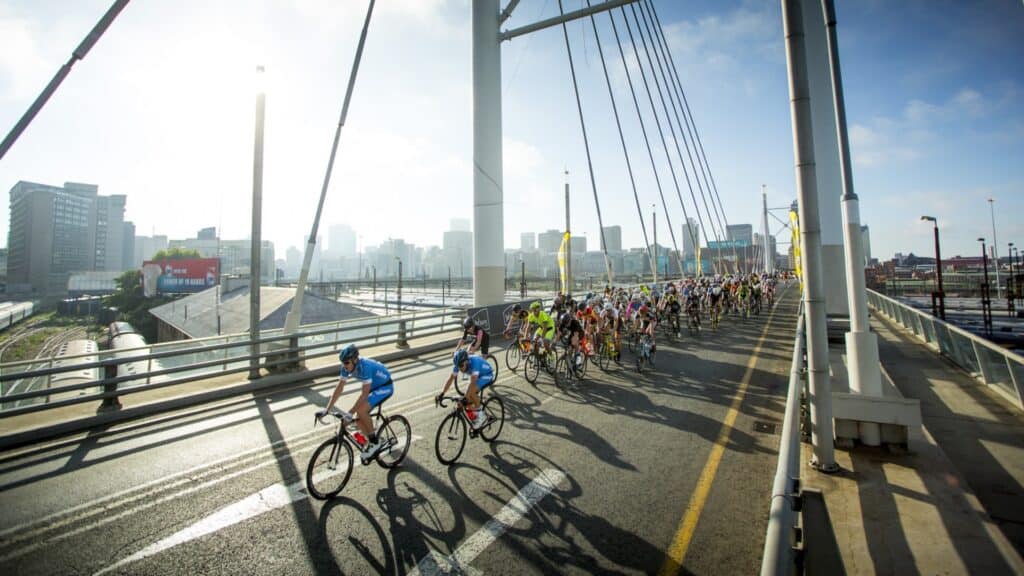
What Is The Virgin Active 947 Ride Joburg?
Virgin Active 947 Ride Joburg, formerly known as the Momentum 947 Cycle Challenge, stands as one of South Africa’s largest and most anticipated cycling events. Held annually in Johannesburg, it draws cyclists nationwide and beyond.
The event, organized by 947 radio station in collaboration with Virgin Active, offers diverse routes tailored to varying skill levels and preferences.
Safety and community spirit are paramount, with robust measures ensuring participant well-being and a strong sense of camaraderie. Preparation is key, with organizers providing resources for both physical training and technical readiness.
On event day, cyclists can expect a well-orchestrated experience, complete with support stations and a celebratory atmosphere at the finish line. Sponsored by various companies, the event also champions environmental sustainability initiatives. Virgin Active 947 Ride Joburg is not merely a cycling event but a celebration of fitness, community, and the scenic beauty of Johannesburg.
As race day approaches, our cycling coach, Devlin Eyden, reveals 4 things you can do as part of your 947 Ride Joburg training program that will take 30 minutes off your time.
Ride Joburg 947 Training Plan – How to structure your training program
What Discovery 947 Ride Joburg training plans are available?
PLUS…The 947 Vitality Short Ride training plans
BRAD BROWN: Welcome to another edition of RIDE. I’m Brad Brown and with us, we’ve got one of the coachparry.com coaches, our cycling coach Devlin Eyden.
Devlin, welcome. Nice to touch base once again.
DEVLIN EYDEN: Brad thanks a lot. Good to be here again.
BRAD BROWN: Dev, I’m super amped to be talking about what we’re chatting about today because it’s not too long to go now to the next edition of the 947 Ride Joburg. I know a lot of people who are trying to get faster and improve their time. What I wanted to chat to you about today was how to take 30 minutes off your 947 Ride Joburg time. It doesn’t matter if you’re going for a sub-6, sub-5 or a sub-4. Possibly a sub-3. These principles apply to everyone although they will make a big difference on your cycling goals when it comes to the 947 Ride Joburg. It’s a great race.
Before we get into that, one of the things that I love about it is that you don’t get an opportunity like that any other time of the year to ride down the M1 on a bicycle. I don’t know about you but for me, that’s my favourite part of the route.
DEVLIN EYDEN: Yes it is phenomenal from that point of view and I think one of my favourites is also just having the opportunity to ride through Joburg itself. Like you say, having the opportunity on the M1 but exactly the same sort of thing with road closures right through the city centre. Some of the really cool landmarks of Joburg and having that opportunity in itself is brilliant.
BRAD BROWN: Yes, absolutely. Well, Dev, you’ve put together 4 points that you think if people focus on they can really dial in their performance and can take 30 minutes off their time.
How to shave minutes off your 947 Cycle Challenge time
The first one you mentioned was following a structured 947 training plan. Tell me a little bit about your thinking behind how people can structure their 947 training and what they need to do.
DEVLIN EYDEN: Firstly, before we go on. 30 Minutes, we’re obviously putting a thing on here on taking 30 minutes off your time. But I think it is just important to make clear that whether it’s 30 minutes or 20 minutes or whatever it is, the goal is to take a chunk of time off.
When I talk about the structure of your 947 training plan, this is what I mean. What I find a lot is that riders will typically come, they’re putting in a lot of hard miles, putting in a lot of miles as well. And it’s all good and well to be doing that but how much of that actually has structure and has a plan behind it? I think that’s where it becomes a little bit more important.
So if we go online and we google 947 training plans and what have you, the buzzword around is interval training and high-intensity interval training. Now that has its place and it’s very important and different intervals have different goals. Whether it’s trying to get a power endurance interval that you’re working on, typically being something of high intensity but a little bit longer. Or being the really high-intensity speed work or strength work for climbs and that sort of thing. Each type of interval has its place.
A structured 947 training program – know when to do what
I think it’s just important, where the structure comes into it, to be able to know when to do what in your 947 training cycle. And I think that’s very important. I’m seeing it more and more with riders that are sitting on watt bikes in the gym or sitting on their indoor trainers.
They’re following an interval block because they found intervals and someone has told them to do intervals, but they’re just doing high-intensity work and that then becomes the only training they’re doing.
They’re not doing any of the endurance stuff. Any of the lower intensity, cardiovascular type of work that they need to be building that cardiovascular engine, as I like to call it. So I think from a structured 947 Training plan point of view there, it is important to get an idea of where you are in your training cycle and also get assistance. Having a coach or someone put a 947 Ride Joburg training program together that knows how much time you have before a goal race.
How much of that can be done in, let’s call it base type of training, how much of it can be done in strength particular phases, and then the power work and speed work obviously closer to the time.
That is my biggest key point when I talk about the structure of training itself. And then also how much recovery work are you doing? We talk about recovery and people think ah, complete rest days. Yes, there needs to be complete rest days in your training week but there also needs to be recovery rides.
Take your recovery rides in your 947 training plan seriously
There needs to be the kind of stuff where it’s really low-key, you can sit on an indoor training in front of the TV in the evenings for 45 minutes or an hour, basically just ticking the legs over and flushing the system to make sure that your legs and your body are ready to go for the next hard session the next day. So that’s another thing I’m seeing more and more of.
The guys are seeing intervals, they’re seeing high-intensity training and they’re neglecting the recovery worth the long-distance type of rides as well. I think that is important from a structural point of view.
Then there are points as well, how are we going to take time off. Knowing the 947, especially the last section of the race is very hilly. So how much hill work are the riders doing?
I think the focus there needs to be on whether it’s indoor trainers, high-power work, or getting out and doing hill repeats. And that can be done; again it doesn’t necessarily have to be focused on a road, so if you’re a mountain biker you can be doing hill repeats off-road on technical sections as well. But finding yourself a piece of road that’s got a really good gradient and sitting out and doing long-ish intervals on that. Something that is just accustoming the body to being able to handle those sorts of climbs that you are going to be hitting on race day as well.
The importance of rest between hill repeats
Hill repeats are important and in doing hill repeats, just a tip that if you are going to be putting high powers out for a duration, let’s call it a 4 or a 5-minute type of hill climb, it’s important to be giving at least a 4 and 5-minute rest in between each of those repeats as well. So when we’re doing really high-intensity stuff like that it’s important that the rest is as long, if not even longer, so that the next time you do that interval you can still be giving it your all out there and you’re recovering well between each interval, so that’s important.
The number one priority in the 947 training plan is consistency
And then I think probably the biggest thing, and when we start talking of structure of the 947 training program, is consistency in training. Now that word, consistency with regards to training in our general lifestyle, we get busy and work gets in the way. Those of us that have families and kids, you’ve got school commitments. That’s understandable.
So, it’s one, making sure the training you’re getting is the most out of the little bit of time that you do have available in a week and then also making sure that you are consistently training.
Again, I’m seeing it regularly with clients that miss one or two sessions, or miss three or four sessions in a week because they’ve had either an illness or they’ve had other work commitments and that’s fine.
But it’s also a case of how we then restructure the week. Rather than trying to play catch up and missing out on the vital recovery rides for instance. Or the long slow distance ride and again, we only then start focusing on the high-intensity stuff. Consistency of training is probably the number one priority and then from there building on how are we structuring our weekly 947 Ride Joburg training program.
Consistency in your 947 Ride Joburg training gets you through race day
BRAD BROWN: Yes absolutely. I could not agree more. Consistency between now and race day. If you are training consistently, that’s one massive hurdle that’s going to help you take a big chunk of time off.
Devlin’s talking about training programs, if you’d like to get one by the way, head over to https://coachparry.com/training-programmes/ and then click on the cycling programs and there’s a 947 Ride Joburg Training program.
Dev, the second point you mentioned has got to do with diet and losing a couple of spare kilograms before race day. And we see it so often, guys spend thousands and thousands of rands on a new frame or new wheels that take a few grams off, but if they lay off cheeseburgers it would make a bigger difference.
Your weight on race day
DEVLIN EYDEN: Yes, it definitely will. That I suppose could be a bit of a sensitive topic in the sense of when we start talking riders that really don’t have 3 or 4 kg to lose I suppose it’s a different story. Whereas there are riders who do have that to lose and might struggle to lose that as well.
So, I think first and foremost is making sure that you are on some sort of structured diet. Not necessarily a structured diet, but that you are conscious of what you are taking in that’s focused around the kind of training that you’re doing. The kind of racing that you’re going to be doing. I’m talking in the sense of making sure that you’re fuelling the body well and that you are eating enough.
Don’t knock your performance with poor 947 Ride Joburg nutrition strategies
When we start talking about weight loss, first and foremost people start to really restrict what they’re taking in and it then knocks your performance because now you’re not fuelling the body enough.
Personally, I’ve had issues with fluctuation of weight and all that sort of thing. And I think the one thing from a personal point of view that’s really worked for me, is to not necessarily follow a particular diet. That for me, just from a mental point of view, feels like I’m being governed by something. So I think more importantly, find something that works for you but be aware of what you are taking in. Have some discipline in the sense of Well, I’m going to lay off a little bit of the sugars, focus a little bit more on the vegetables”.
Keep a balance on what you eat
Making sure that we’re fuelling the body enough for the kind of training that we’re going to be doing but also not unnecessarily eating things that we really shouldn’t be. In saying that though, I think it’s important to have a balance. Again, if we go to one complete end of the scale we’re going to be really strict on everything that we do.
There comes a point where you’re going to have a craving and you might crack. Then it becomes a binge day rather than maybe a cheat meal. So I think there needs to be a level of balance. That is why I personally like to stay away from structured diets and focus a little bit more on what I’m taking in from that point of view.
It is important though, when we are looking at weight loss, that you are consulting a dietician. Consult someone who is a professional in the field who can then also have a look at you and what your personal needs are. So in terms of how stressful is your job on a daily basis? How much training are you doing and making sure that you’re eating around that as well?
Also, eating and taking in the kind of food and the kind of drink that is necessary that allows you to sleep. Things like that we take for granted and we don’t think of. It’s a cup of coffee in the evening, whatever it might be, and then we lie wide awake. Making sure that we’re structuring what we’re doing around how much food or how many calories we’re taking in around the kind of training that we’re doing. The kind of racing we’re doing and what our daily lives consist of.
Take in enough to fuel your body at the 947 Ride Joburg
I think more importantly, we need to find the balance and chat with a professional in the field regarding a dietician or a nutritionist. That’s the best way to go about it.
Again, there’s a lot of information, and everyone seems to be an expert on the topic. I think chat with a professional and listen to one person’s advice regarding this. When we start talking diets as well as weight loss and nutrition, it is then important, like I’ve touched on, to take in enough to fuel your body, but it’s also important what are you doing from a nutrition point of view on the bike.
While on our long training rides, racing, whatever it might be, what are we taking in to actually fuel for those events and for those rides? What I refer to by that is are we taking in sugary kinds of stuff, so the jelly babies and the sweets? Stuff with more of a carbohydrate base. Whether it’s going to be sandwiches, for instance, bananas, that kind of thing. Or some people again have their preference for nuts and fats and that kind of thing.
Finding the right nutrition that works for you
What is important though, again chatting to someone who knows what they’re talking about in the field. Finding something that works for you but making sure that you’re not physiologically putting your body into a state of shock. Where you’re not eating during the rides and suddenly afterwards you’re starving, you put something into your body and that in itself is storing and how we pick up weight quite quickly.
Rather eat during the events. I see it time and time again; guys will go out for 3 or 4 hours rides and literally ride on bottles of water. It’s important, let’s find what works for us but make sure we’re fuelling the body right.
To lose weight on the bike doesn’t necessarily mean that we need to starve ourselves. Just cut back. Let’s be cautious from that point of view and I think my main point here is to chat with a professional and someone that can guide you around your specific needs.
The role of 947 Ride Joburg seeding
BRAD BROWN: Dev, you and I were chatting the other day about going for quick times at the 947 Ride Joburg and we were talking about the role that seeding plays. For a lot of recreational cyclists, the only cycling race that they do is the 947 Ride Joburg and they end up starting way back. And it’s really difficult to ride a decent time at a race like the 947 if you don’t have a decent seeding and it can play a big role.
I know, me personally, I’ve done a couple of sub-3s and there’s no way I would have done those sub-3s if I didn’t have a very good seeding.
And in my case, it had nothing to do with seeding races, I was just lucky that I worked for 947 for many years and could wangle myself a good seeding. But seeding races is a great way to get a bit of a head start before you’ve even started racing.
DEVLIN EYDEN: Correct, and I like the way you put that from a head start point of view because that’s exactly what it is. And like you’ve mentioned, you’re starting towards the back of the field.
You’ve got 26 000 riders that you’re trying to wangle your way through if you’re starting later in the day. That makes it really difficult because it doesn’t matter what level of cyclist you are. When you’re dealing with other people on the road who don’t necessarily have consideration or don’t necessarily have an awareness of where you might be on the road, it makes things very tricky when you’re getting into a zone of your own and trying to push for a time.
Get your 947 seeding up with training cycle events
The suggestion here would be it doesn’t necessarily have to be the same sort of distance races. Try and find something, one or two seeding races leading up to the event that we can use as training as well.
You don’t need to be putting in your best possible ride and if it is something where the 947 Ride is your first road race. Or it might be the only race that you do on a yearly basis. Add one or two other races in but let’s count it as training events.
Don’t make it a daunting thing. Because the more races that you do and you are doing seeding races, you’re doing decent enough times. It will also just allow you, from a seeding point of view as well, it will allow you to have a slightly better seeding whether you’ve got a fantastic time or not. It’s more a case of you doing regular races so you’re gaining the seeding points as well. Versus someone that has either never raced before or only races the 947 Ride Joburg once a year.
So I think from that point of view, have a look at what is out there. There are plenty of races throughout the year. Find something near you. Again, you don’t have to travel too far. Something that you can target as trying to get a slightly better seeding.
Ride for charity to improve your 947 Ride Joburg seeding batch
Another option as well, and it’s really a good initiative from the 947 Ride Joburg side of things. Cycle Challenge has got their various charity batches. So if that is something that does interest you, have a look at joining a charity that you might have an interest in. From that point of view, the charity batches will generally get a slightly better seeding as well. So they will put charity batches, depending on whatever charity it might be, slightly ahead of those that are completely unseeded and haven’t done any racing before.
With seeding and the benefits of it as well, getting a better seeding and an earlier start. Besides not having the crowds, is also if it’s hot on the day and you’re starting later or starting towards the back end of the field, it means the heat kicks in. You’re out there for a lot longer as well and heat in itself is then going to obviously affect your performance and how fast you can ride this route.
It just means that you’re probably going to stop more at water points. It means that you’re going to have to stop somewhere along the line and take a break here and there. If you’re not necessarily stopping, heat will still have a negative effect on your performance when you’re overheating.
From that point of view, that’s another benefit of getting a better seeding and why it might be worth doing one or two of the other races to get a head start and start slightly in the cooler temperatures of the day and try and be finished before the heat of the day actually kicks in.
Your 947 Ride Joburg race day planning, strategy and management
BRAD BROWN: Your final point is race day planning strategy and management. And the seeding almost plays into that as well because the better seeding that you have, the earlier you start and the better cyclists you are with. You’ve got more chance of getting into a group that you can jump into that can help you. But let’s talk about race day strategy and one of those things that I know you wanted to touch on was riding within a group on race day.
DEVLIN EYDEN: Yes, and that’s very key. And that goes for the 947 Ride Joburg, it goes for any type of race or event that you’re going to do, having a plan and having a strategy before going into it.
Ride in a group and save energy
Like you mentioned there, the point of groups is you starting, again it doesn’t really matter what batch you start in, but there’s always going to be guys that cluster together. Ride in a group that is of similar strength and riding in a group is going to benefit you on the day. It helps you with the slipstream. It has that little bit of motivation with the guys around you. So from that point of view saving energy riding in a group, is going to be key to finding someone to latch onto.
In saying that, and we’ve mentioned it in the past, but in saying that make sure that you’re also comfortable riding in a group just from a skill point of view. That’s an important thing just to take note. But riding in groups and having your plan for the day is also important you need to find a group that’s relatively paced to you as well. So something that you’re comfortable with.
You generally find that we get onto the M1 and the guys are all excited for the ride and a group start coming past you and you latch onto them. Before you know it, before you get into the city centre, you’ve completely burnt all your matches and you’ve blown out the back because they were a little bit too hard for you and you felt that you could stick on. And 40, 50k into the ride you’ve got nothing left in the tank.
Ride with well-matched riders
So again, try and find a group that is relatively well matched to you and if there isn’t a group around you, start a group. There are plenty of people on the road that you’re going to be riding around that you will see over and over again throughout a race and strike up a conversation. Guys are always in the same boat as you looking for someone to help them out, someone that they can help out, whatever it might be. Start a group and sit at your pace, sit where you’re comfortable. That I think is first and foremost.
And then also, tying into the strategy of the race itself is knowing the route. You don’t necessarily have to go and drive the entire route before, but the route maps and route profile are out well in advance before race day.
Get to know the 947 Ride Joburg Route before race day
Have a look at where the water points are on the route, so if you feel you need to stop at a water point, you’re going to make those stops that are not necessarily going to lose you too much time.
And also knowing where you have to hold back a little bit and where you can attack. When I say attack, rather push the pace up and go a little bit harder. I think that’s key. You’ll find it again where I say hold back, is things like that M1 coming into Joburg where you’ve got so much adrenalin going. It’s race day, there’s a lot of people, a lot of vibe around you and you’re going out a little bit too hard. But you’ve forgotten or you haven’t been aware of how much climbing is still left in the last 15 to 20ks of the race.
So having a plan of knowing where you can go hard, where you need to hold back a little bit. If you’re not necessarily a strong climber, get up those climbs without burning too much energy. So rather than putting it in a slightly easier gear knowing how long the climb is, knowing there’s another climb to come after this one. Being able to get yourself into an easy gear, tick it out and maybe put the hammer down a little bit after the climb or on a slightly flatter section where you know you can make up a little bit of time there.
Forward-thinking and planning can crack your PB
It’s forward thinking, and forward planning that’s important here when we talk about your strategy on race day as well. Tying into your strategy, like the last point as well, is your nutrition. Being able to plan how much nutrition you need, and when. Knowing where, if you’re going to run out of fluids here, you know that you can stop at a water point there. You can refill your water bottles, get some bad ones or some bananas in, whatever it might be. So that all ties in to having a plan on race day and sticking to that plan on race day.
It is also advisable to have yourself a plan B. If you know that you’ve gone out a little bit too hard, ok, if you’ve got a goal time. How much time are you willing to sacrifice here to maybe try and make it up further into the race? So it comes down again to just forward thinking, forward planning for race day itself.
BRAD BROWN: Absolutely. Dev, I think those tips are awesome. I think we’re going to have lots of people taking lots of time off their PBs at this year’s 947 Ride Joburg.

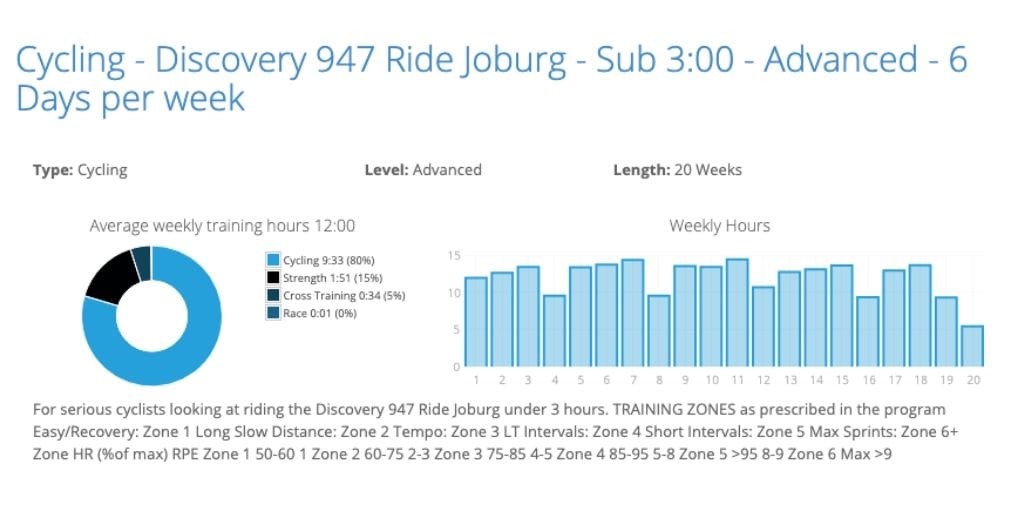
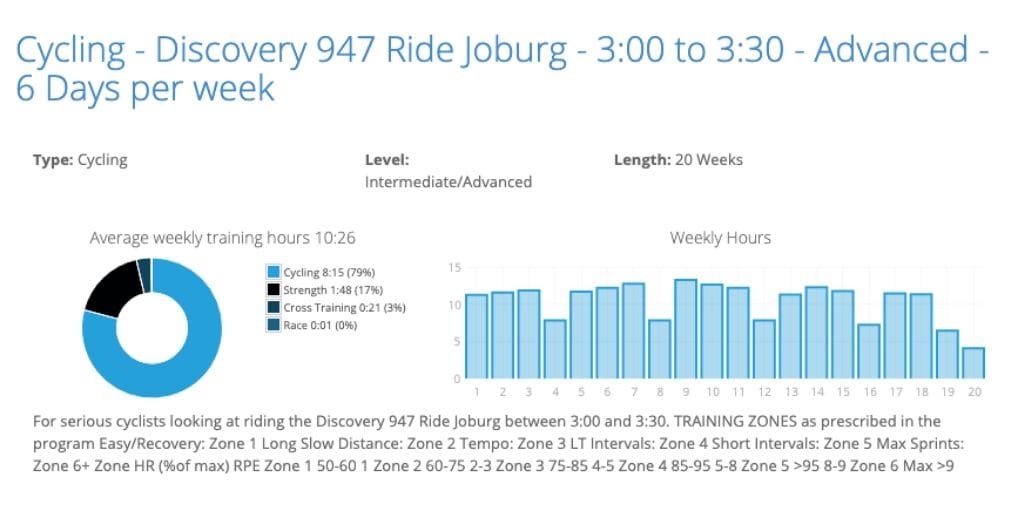

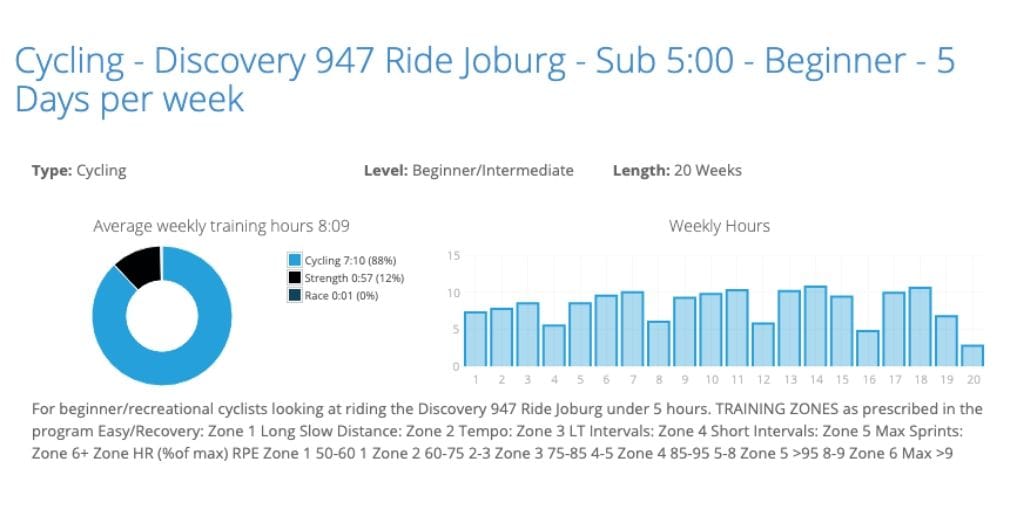
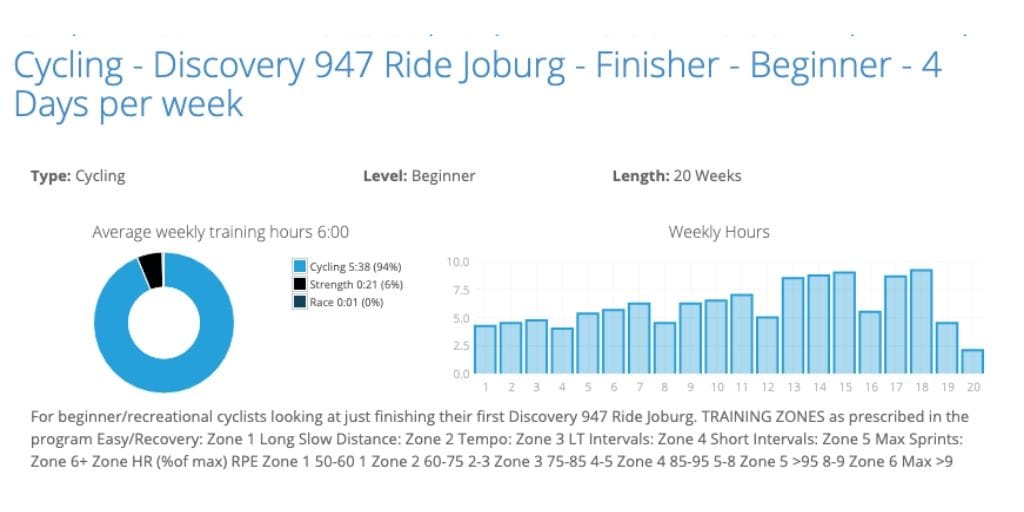
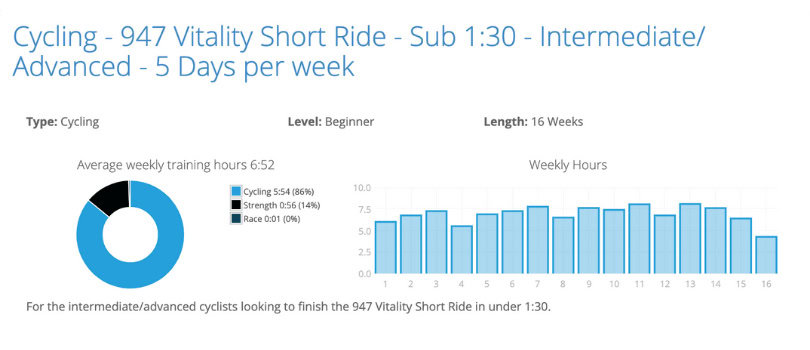
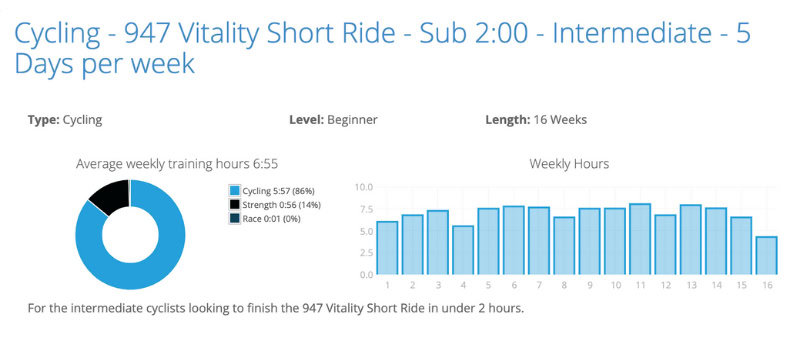
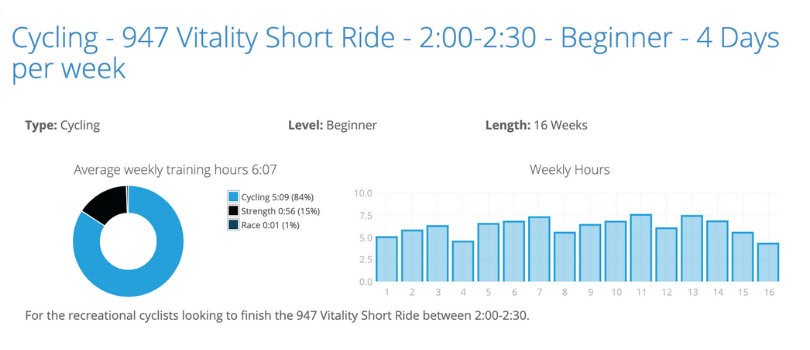
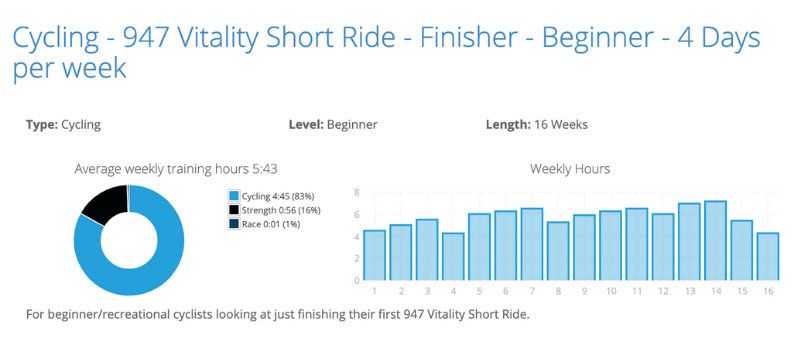


Comments are closed.